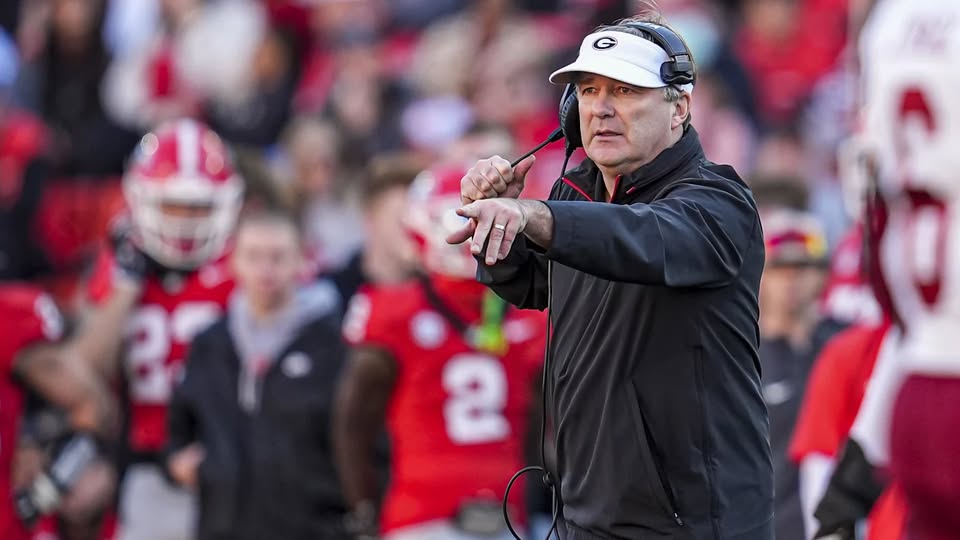
Georgia Bulldogs’ Record-Breaking Reign Faces Its Greatest Test Ahead of the 2025 College Football Season With New Challenges Looming
Georgia football has dominated college football over the last several years in a way few programs ever have. Under the leadership of head coach Kirby Smart, the Bulldogs have built a juggernaut fueled by top-tier recruiting, elite defensive play, and a culture of winning that rivals the most dominant dynasties in the sport’s history. With two national championships, a series of undefeated regular seasons, and a talent pipeline that doesn’t seem to slow, Georgia’s run has been nothing short of remarkable.
However, as the 2025 college football season approaches, there are growing questions about whether this historic streak can continue. The Bulldogs are facing a confluence of challenges that, individually, might be survivable—but taken together, they threaten to derail one of the greatest runs in modern college football history.
For starters, roster turnover is once again a major concern. While Georgia consistently recruits at an elite level, the loss of veteran leadership and proven on-field production could create early-season struggles. Quarterback play, always a critical component, remains a question mark. With Carson Beck now preparing for the NFL, the Bulldogs will have to rely on less experienced options to carry the offense. While names like Gunner Stockton and Ryan Puglisi offer promise, they are untested in the crucible of SEC play.
Then there is the matter of coaching continuity. Georgia has lost several key assistants to promotions elsewhere, and while Smart has done a masterful job replenishing his staff in the past, every new hire brings uncertainty. Defensive coordinator Glenn Schumann, long considered the brain behind Georgia’s dominant defenses, is now on the radar for head coaching positions. If Schumann departs before or during the 2025 season, it would represent a significant disruption to a defense that has been the Bulldogs’ backbone.
Injuries, too, are always a variable that can’t be controlled but can deeply influence a season. In the ultra-physical SEC, depth is critical—but even Georgia, with its layers of blue-chip athletes, is not immune. Key injuries, particularly at offensive line or linebacker, could expose vulnerabilities the program has not had to confront in recent years. The physical toll of multiple playoff runs adds up, and cumulative wear could play a bigger role this season.
Another major factor is the evolving landscape of the SEC. Texas and Oklahoma are now full members, and their arrival fundamentally changes the competitive dynamics of the conference. Georgia’s path to Atlanta for the SEC Championship Game is now fraught with more potential pitfalls. Both newcomers bring historic pedigrees and recruiting firepower of their own. That, combined with the rise of teams like LSU, Alabama’s continued presence, and emerging programs such as Ole Miss and Missouri, means Georgia’s weekly schedule will be as brutal as ever.
Moreover, the expanded College Football Playoff format introduces new risks. While in theory, a deeper field gives a program like Georgia more margin for error, the increased number of games can lead to added physical and mental strain. Surviving through an SEC slate, conference championship, and then multiple playoff games requires a level of durability and consistency that is incredibly difficult to sustain year after year.
And then there is the psychological aspect. Complacency, even when denied publicly, can creep into a program after years of success. Opposing teams now treat games against Georgia like championship opportunities. The Bulldogs no longer sneak up on anyone—they are the gold standard, the measuring stick. Every week, opponents bring their best, often resorting to unorthodox tactics or playing with nothing to lose. That mental burden of being the hunted is exhausting over time.
Recruiting is still strong, but the NIL era brings another layer of complexity. Retaining talent has become just as important as acquiring it. With players now able to move more freely through the transfer portal, even a minor dip in playing time or internal morale can lead to unexpected roster departures. Managing egos, expectations, and market value has become part of the modern coach’s responsibility, and while Georgia has been adept so far, the environment is increasingly volatile.
The 2025 schedule itself is daunting. Georgia opens with a non-conference game against a top-15 opponent, followed by a stretch of SEC games that includes Texas, Florida, and Alabama—all within a two-month span. While Georgia is used to big games, the density of top-tier matchups is higher than in previous seasons. Even with home-field advantage in some of those contests, the risk of a mid-season slip-up is very real.
From a schematic standpoint, other teams are catching up. Coaches around the country have spent offseasons dissecting Georgia film, looking for any edge. Whether it’s mimicking their defensive fronts, adjusting offensive game plans to exploit zone weaknesses, or managing tempo more effectively, the arms race in college football strategy is rapidly closing the gap. The Bulldogs’ defensive line dominance, for instance, once a guaranteed advantage, now faces more sophisticated countermeasures than ever before.
There’s also the issue of leadership. Every great team needs vocal, respected leaders in the locker room and on the field. The Bulldogs are transitioning from a group that was filled with experienced captains to a newer generation. Whether that next group of leaders emerges quickly could make all the difference in how Georgia responds to adversity. Championship teams aren’t just about talent—they’re about accountability, unity, and resilience in the face of pressure.
Kirby Smart remains one of the best coaches in the country, but even he is not immune to the shifting tides of the sport. The pressure on him to sustain perfection is immense. Fans, boosters, and media now expect not just SEC titles, but national dominance year after year. The standard Georgia has set is so high that anything short of a title can feel like failure. That type of expectation can create internal strain, especially among younger players not yet used to such a spotlight.
It’s important to recognize that Georgia is still very much a national contender. The program is too well built, too well resourced, and too disciplined to collapse. But cracks don’t always appear as losses—they show up in tighter games, closer margins, and missed opportunities. The streak they’ve maintained—multiple seasons of near-perfection—is simply unsustainable over the long haul, especially in this evolving college football climate.
And yet, this is what makes 2025 such a fascinating inflection point. If Georgia survives these challenges and reaches another playoff—or even wins another national title—it would elevate their run into an even higher historical echelon. We would be talking about the Bulldogs not just as the best team of the last five years, but perhaps the most dominant college football program in modern history.
But if they falter, even slightly, the narrative shifts. Suddenly, other programs will smell blood in the water. Recruits who once saw Georgia as the only option might reconsider. The SEC pecking order, long seen as tilted in Georgia’s favor, could recalibrate. And once a dynasty starts to slide, it can happen faster than anyone expects. We’ve seen it before with Florida, USC, and even Alabama to some extent—dynasties don’t end with explosions, but with erosion.
The 2025 season, then, is more than just another campaign. It’s a referendum on sustainability, depth, culture, and resilience. Georgia has the tools to maintain its place atop college football, but the margin for error is thinner than ever. Every decision, every substitution, every play call could carry outsized importance.
Georgia fans, accustomed to excellence, will be watching closely. The rest of the country will be waiting—some to see history continue, others hoping for a crack in the armor. One thing is certain: the 2025 season promises to be one of the most consequential in Georgia football history. Whether the Bulldogs continue to roar or finally stumble, the spotlight will be firmly fixed on Athens, Georgia.







